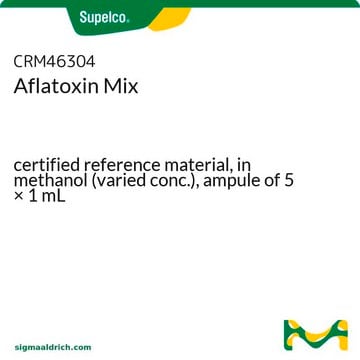ERMAC060
Aflatoxin G2 solution
3.80 μg/g in acetonitrile, ERM®, certified reference material
About This Item
Recommended Products
grade
certified reference material
Agency
ERM®
manufacturer/tradename
JRC
concentration
3.80 μg/g in acetonitrile
application(s)
general analytical
format
single component solution
storage temp.
2-8°C
SMILES string
COc1cc2O[C@H]3OCC[C@H]3c2c4OC(=O)C5=C(CCOC5=O)c14
InChI
1S/C17H14O7/c1-20-9-6-10-12(8-3-5-22-17(8)23-10)14-11(9)7-2-4-21-15(18)13(7)16(19)24-14/h6,8,17H,2-5H2,1H3/t8-,17+/m0/s1
InChI key
WPCVRWVBBXIRMA-WNWIJWBNSA-N
Looking for similar products? Visit Product Comparison Guide
Analysis Note
ERMAC060
Legal Information
Signal Word
Danger
Hazard Statements
Precautionary Statements
Hazard Classifications
Acute Tox. 4 Dermal - Acute Tox. 4 Oral - Eye Irrit. 2 - Flam. Liq. 2
Storage Class Code
3 - Flammable liquids
WGK
WGK 2
Flash Point(F)
35.6 °F - closed cup
Flash Point(C)
2.0 °C - closed cup
Choose from one of the most recent versions:
Certificates of Analysis (COA)
Sorry, we don't have COAs for this product available online at this time.
If you need assistance, please contact Customer Support.
Already Own This Product?
Find documentation for the products that you have recently purchased in the Document Library.
Customers Also Viewed
Protocols
LC/MS/MS Analysis of Aflatoxins in Hops on Ascentis® Express 2.7 μm Phenyl-Hexyl after Cleanup Using Supel™ Tox AflaZea SPE
solution, 2 μg/mL in acetonitrile, analytical standard
Our team of scientists has experience in all areas of research including Life Science, Material Science, Chemical Synthesis, Chromatography, Analytical and many others.
Contact Technical Service






